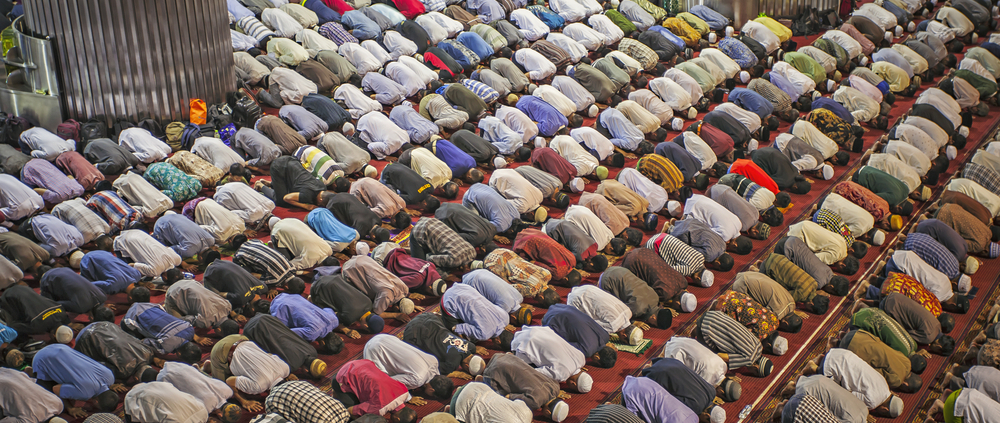Does the Presence of Non-muslims in the Congregational Prayer in Validate the Prayer of the Believer?
Answered by Ustadh Sufyan Qufi
Question
When praying in a row during jamah, if one of the people is a non-Muslim, does that affect the validity of the Salahs of the Muslims?
Answer
I pray this finds you in the best of states.
Your prayer, as a follower, remains valid despite the presence of non-Muslims in the congregation. [Shurunbulali, Nur al-Idah]
A Non-Muslim Praying in Congregation Is Legally a Muslim
The mere action of praying as a follower in a congregation of Muslims within the valid time of the prayer while completing this prayer leaves us no choice but to consider the person who has performed this prayer a Muslim. [Ibn Abidin, Radd al-Muhtar]
The Messenger of Allah (Blessings and Peace upon Him) has said: “The person who has prayed our prayer while facing our qibla is from us.” [Bukhari]
Thus you should disregard any doubts regarding the validity of your prayer because, in this situation, you have to consider all these people Muslim.
Validity of the Prayer of the Follower
The only person able to invalidate the prayer of a believer in a congregation, without the believer being able to do anything about it, is the Imam.
If the prayer of the Imam is invalid, then the prayer of the follower is invalid. [Shurunbulali, Nur al-Idah]
As for the person praying next to you, the invalidity of his prayer is of no consequence for the validity of your prayer.
The prayer of a non-Muslim is invalid because the intention (niyya) is from the conditions of validity for the prayer. The intention is defined as intending to obey and get closer to Allah, Most High when performing an action. [Tahtawi, Sharh ala Maraqi al-Falah]
This is not conceivable from a disbeliever. Thus his prayer is invalid. This is not different from a Muslim praying next to you without wudu: his prayer is invalid, but your prayer remains unaffected. These instances are not listed in the invalidators of the prayer. [Shurunbulali, Nur al-Idah]
Exception to This Ruling
When a woman prays next to a man in a congregational prayer, then this man’s prayer is invalidated. But it is enough for this man to indicate to the woman to move back in order for him to ensure the validity of his prayer. Even if the woman refuses to move back, this man’s prayer will remain valid. [Ibn Abidin, Radd al-Muhtar]
For this reason, we have said at the beginning of this answer that the Imam is the only person able to invalidate the follower’s prayer without any recourse.
Answer from the General Iftaa Departement of Jordan
In order to be at ease with the answer above, I add below an answer from the Iftaa department of Jordan regarding a similar issue:
Question :
Some non-Muslims have joined us while performing Eid prayer. Is this permissible?
The Answer :
All perfect praise be to Allah, The Lord of The Worlds, and may His peace and blessings be upon our Prophet Mohammad and upon all his family and companions. There is no harm on you if non-Muslims have joined your prayer, and you aren`t permitted to stop them from doing so; rather, you should encourage them and bring them closer to Islam and Muslims since doing so could make them embrace Islam. However, their prayer is considered invalid since being a Muslim is among the key conditions for the validity of prayer. Nonetheless, this doesn`t mean that you stop them from praying with you, especially since some of them may have already embraced Islam, but haven`t declared that yet. If they are as such, their prayer is valid, and they will be rewarded for it, with Allah`s permission. And Allah knows best.
Please see: Ruling when Non-Muslims Join Muslims in Prayer
And Allah knows best.
Wassalam
[Ustadh] Sufyan Qufi
Checked and Approved by Shaykh Faraz Rabbani
Ustadh Sufyan Qufi is an advanced seeker of knowledge, originally from Algeria, who grew up in France. He began searching far and wide for answers to the fundamental questions of life and was disappointed at the answers he found. Then he connected with various traditional teachers and gradually connected with SeekersGuidance. He embarked on his journey of learning through the various teachers at SeekersGuidance, including his mentor Shaykh Faraz Rabbani. He studied numerous texts in Islamic Law, Theology, Hadith, and other areas with Shaykh Faraz Rabbani and other teachers, including Shaykh Abdurrahman al-Sha‘ar, Shaykh Ali Hani, and others. He is an active instructor at SeekersGuidance and answers questions through the SeekersGuidance Answers Service.
